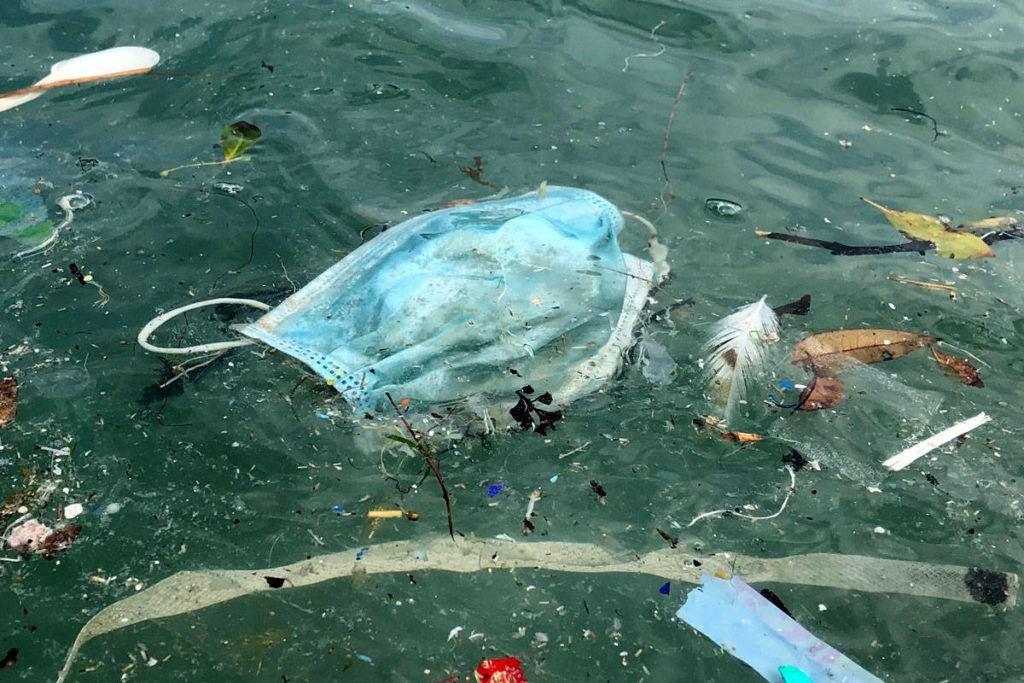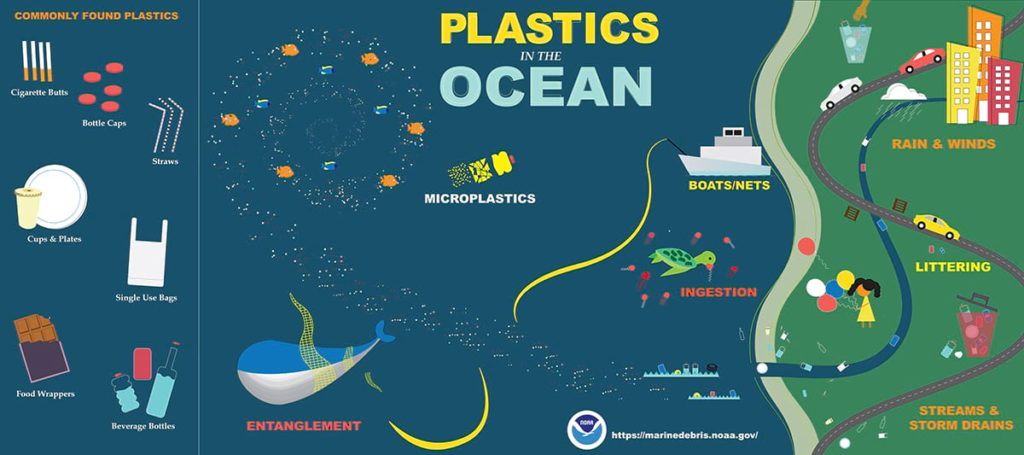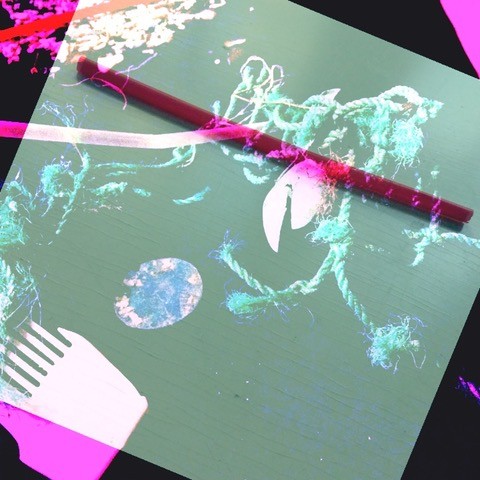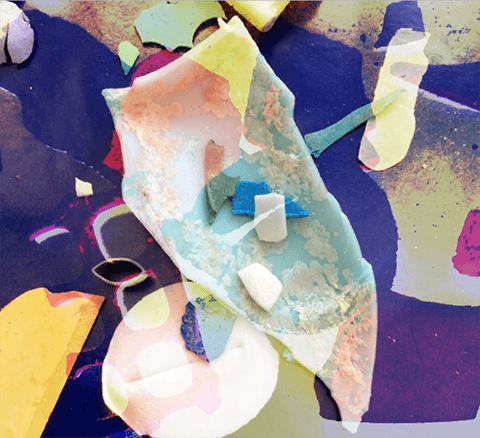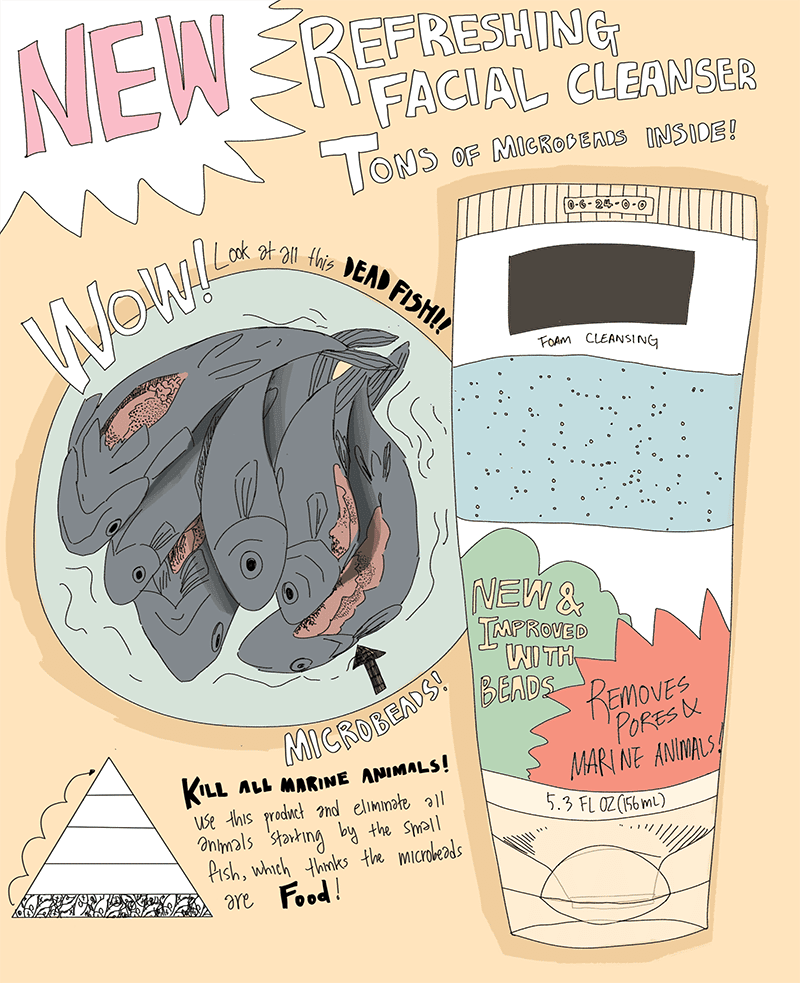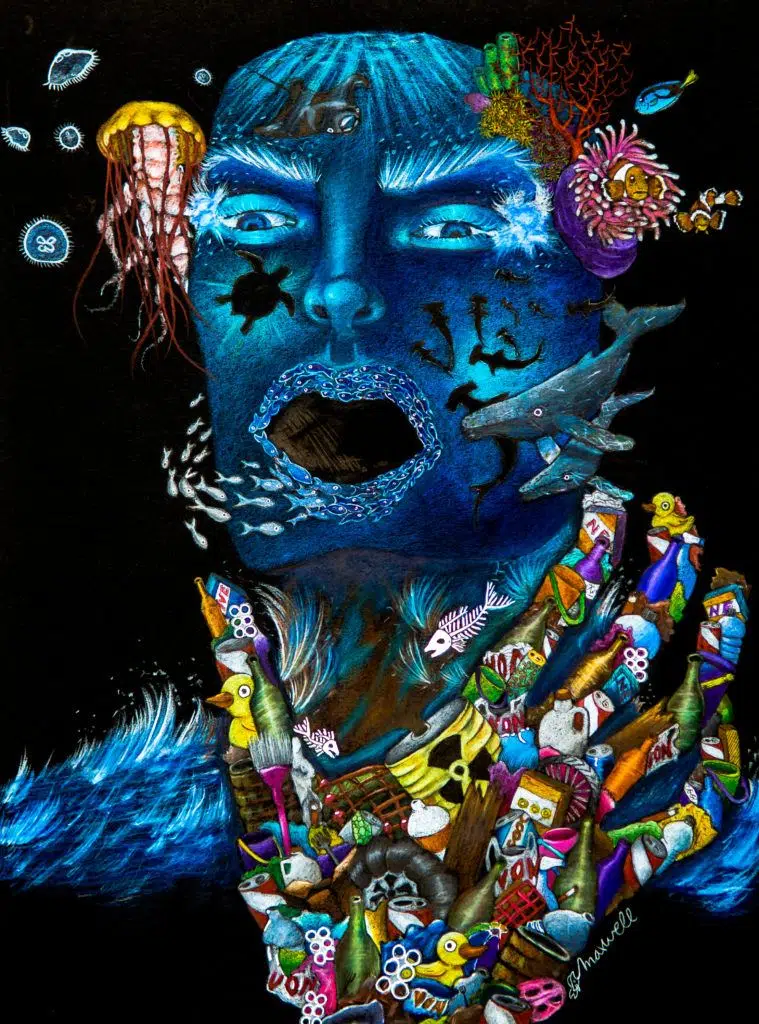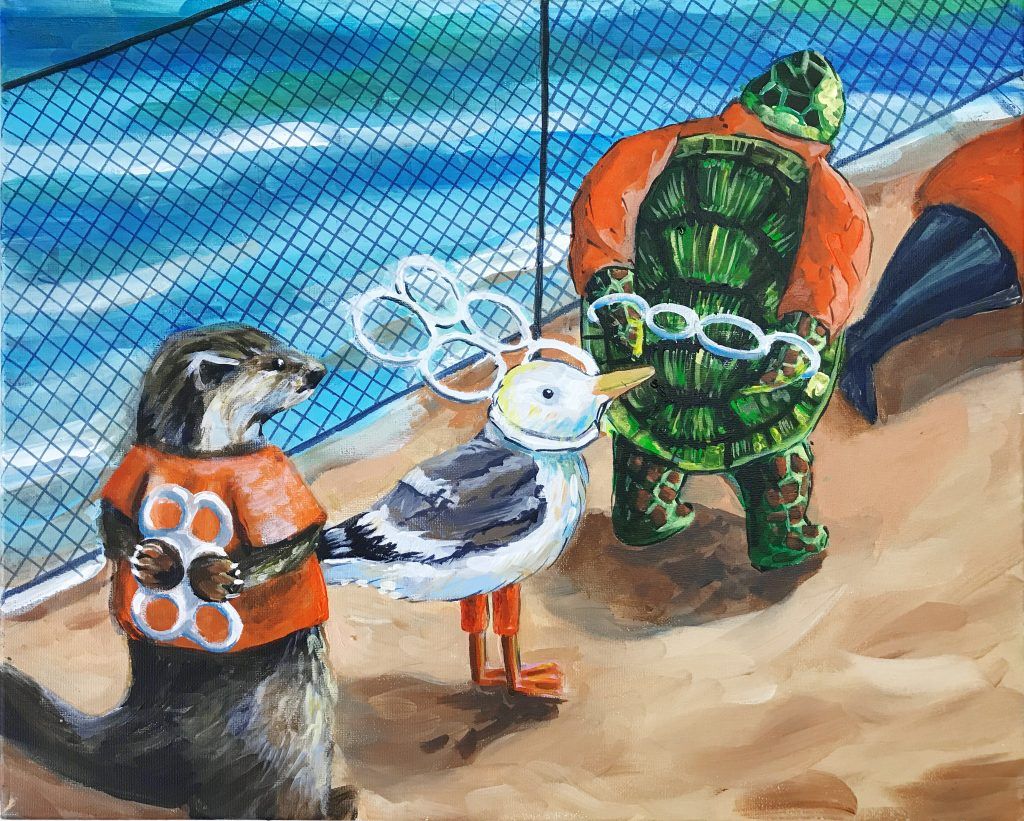
Plastic Pollution in the Age of COVID
December 11, 2020Featured image by our Founder and President Linda Cabot
There has perhaps been no greater period of uncertainty than the one we have faced during the COVID-19 pandemic. Particularly at its onset, when data and research was still scarce, figuring out what precautions to take was a challenge in and of itself. As the world scrambled for answers and appropriate safety measures, the fight against plastic pollution was overshadowed by safety concerns.
While the scientific community is still exploring many questions about the virus and how effective certain safety measures are against its spread, we now have much more information than we did in March of 2020.
It has been estimated that 129 billion face masks and 65 billion gloves are being produced globally every month during the COVID-19 pandemic. While the use of single-use plastic (SUP) Personal Protective Equipment (PPE) is warranted for some, such as medical professionals or caretakers in contact with COVID-19 patients, education around sustainable alternatives for lower-risk groups has been largely lacking.
We now know, for example, that reusable cloth masks can be an effective barrier against transmission so long as they are worn and washed properly. We also know that “for the general public, wearing gloves is not necessary in most situations, like running errands,” according to the CDC.
Photo Credit: Naomi Brannan/OceansAsia
Single-use plastics are equated with safety, and not just in the case of PPE—plastic packaging demand is expected to increase by 40%, and many countries, states, and cities reversed plastic shopping bag and food container bans in the wake of the pandemic. A New York plastic bag ban, which took effect in March of 2020, was not enforced until October of 2020 because of a lawsuit brought on by plastic manufacturers. In Massachusetts, local bans on plastic shopping bags were actually lifted and reusable shopping bags were banned entirely. Local ordinances around the U.S. continue to vary widely on whether reusable bags are permissible in the grocery store and are greatly influenced by lobbying by the plastic and fossil fuel industries.
“Ok, so more single-use plastic products are being used during the pandemic, but what’s the big deal?” you may wonder.
More Plastic, More Problems
Infographic from the U.S. National Oceanic and Atmospheric Administration
While an exact amount has proved hard to pin down, about 8 million metric tons of plastic are estimated to be entering the ocean every year. Ever come across a wrapper or bottle on the shore or in the water? This year, you may have noticed plastic surgical gloves or single-use plastic masks; in fact, Break Free From Plastic counted hundreds of these in their annual global brand audit, an annual citizen action initiative that documents plastic waste. This plastic waste not only pollutes our oceans and water systems but also chokes and starves marine life.
While an exact amount has proved hard to pin down, about 8 million metric tons of plastic are estimated to be entering the ocean every year.
Get this: pieces of the very first plastics produced and disposed of more than a hundred years ago are likely still floating around in our oceans. That’s because most plastic isn’t biodegradable—instead of being decomposed by bacteria or other living organisms, it simply breaks down into smaller and smaller plastic particles. The resulting pieces of plastic, invisible to the naked eye, are what are known as microplastics. The bivalves that we eat, like mussels, clams, and oysters, act as filters in their marine ecosystems, so they are especially vulnerable to ocean microplastics, impacting our own health. Plastic particles smaller than the diameter of a human hair have also been found to travel in the air, polluting our atmosphere.
Moving Forward With Sustainability During Covid
While Bow Seat has addressed plastic pollution for many years, the COVID-19 pandemic has brought about new challenges to consider when it comes to combating plastic pollution. How do we move forward with facing single-use plastic production, use, and disposal while still addressing legitimate health and safety concerns?
While we don’t have all the answers, we’ve always been a big believer in the power of raising awareness. Sustainability should and can become an important part of the COVID-19 mitigation discussion through widespread awareness of our plastic pollution problem.
Shelby O’Neil, a Gold Award winner from our 2018 Marine Debris Creative Advocacy Competition and Founder of Jr Ocean Guardians, a nonprofit focused on educating and highlighting the problems facing our oceans, serves as a great example of how increasing awareness about the detrimental effects of plastic on our oceans can help turn the tides against plastic use. In 2016, she launched the No Straw November campaign that has since mobilized support for plastic reduction around the country.
The arts can serve as a powerful tool to educate and move people to action, and to pose important questions during uncertain times.
Our Founder and President Linda Cabot created these beautiful art pieces from pictures she took of plastic items and microplastics she found on a beach in Hawaii. “By photographing microplastics, rope fragments, straws and broken combs in particular arrangements I created photomontages with colorful fused layers,” she said. “I found the actual plastic items on a beach in Hawaii which unfortunately tends to get huge amounts of plastic pollution washed onto her shores.”
“I am fascinated how something as destructive as microplastic and plastic pollution can be rendered into a new form of interest, appreciation and beauty. This way of creating makes me wonder how waste is viewed and can be re-imagined. Waste is most harmful because it has lost its purpose. Plastic pollution never biodegrades and instead hangs around like some evil villain forever harming the life of land and marine animals who ingest and become entangled in it. What is the value of creating new ways of making so that products don’t become the waste that harms the environment?”
“I am fascinated how something as destructive as microplastic and plastic pollution can be rendered into a new form of interest, appreciation and beauty.”
—LINDA CABOT, BOW SEAT FOUNDER AND PRESIDENT
Our student artists have also found amazing ways to call attention to our plastic pollution problem.
“Microbeads 2-in-1” by Eun Lee (age 16, South Korea)
“Strangled Seas” by Maxwell Sagermann (8th Grade, California)
“Marine Penitentiary” by Jack Chen (age 15, New York)
“The Tale of Danny and Evi – The Bottle Project” by Gloria Li and Robin Zeng (12th Grade, Florida)
“Plastic Pollution (Cut It)” by Adrian Serrano and Damoni Cato-Cain (11th Grade, California)
“Indispensable Devices, Trashed Every Day” by Connor Webb (8th Grade, Virginia)
The mechanical pencil
I scratch this poem out with
Is plastic
The material of infinite human uses
Destroying our world’s first gift
The keys I will use to tap out
The sad song my pen sings
Are plastic
Used to create a portal of knowledge
But will poison and choke
Earth’s greatest miracle
The pencil may break
Be tossed, useless, in the trash
But probably be lost at school
Swept into a pile with it’s polyester kin
And into the trash, again
Making it’s way to the sea
My laptop will slow to a crawl
Closed, abandoned, superseded
Shipped to Agbogbloshie
Swept into the ocean
The picturesque Ghana sea
To encounter marine life unknown
An unsuspecting marlin
Will swallow a splinter of my pencil
Poked through the stomach
Wasting away in the deep
A careless pelican
Will ingest the keys
That once typed this poem
A nefarious alphabet soup
Working Towards Solutions
Raising awareness is a solid first step in combating plastic waste, but as the saying goes, you’ve got to practice what you preach. Here are a few easy ideas and resources to combat the increase in SUPs during Covid:
- When possible, opt for reusable items like cloth face masks, reusable water bottles, reusable shopping bags, cloth sandwich bags, etc. Just make sure to wash them after each use.
- Avoid items that come in plastic packaging and/or that are individually packaged. Soap, shampoo, and conditioner can be purchased in bar form, for example, rather than in bottles. Researchers led by the U.S. National Institute of Allergy and Infectious Diseases have actually found that the virus may last longer on plastic than on cardboard.
- When ordering out, ask for no plastic cutlery. Even better, reach out to your go-to restaurants and suggest that they replace any plastic cutlery with sustainable alternatives (you can refer them to these Covid-19 guidelines from Oceanic Global).
- Hold corporate plastic polluters accountable by calling them out directly. Tag them on social media, email them, write them, and launch petitions. The Break Free From Plastic Movement publishes an annual brand audit that identifies top global corporate polluters for you!
Even during a worldwide pandemic, we can still keep the 6R’s in mind: Rethink, Reduce, Refuse, Reuse, Recycle, and Rot!

